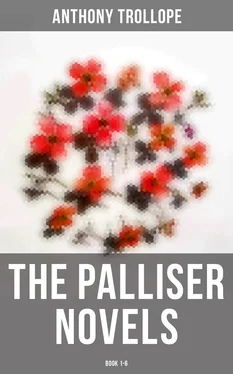"No doubt as far as enjoyment goes," said Mr. Kennedy.
He took them up out of the ravine on to the side of the mountain, and then down by another path through the woods to the back of the house. As they went he relapsed into his usual silence, and the conversation was kept up between the other two. At a point not very far from the castle,—just so far that one could see by the break of the ground where the castle stood, Kennedy left them. "Mr. Finn will take you back in safety, I am sure," said he, "and, as I am here, I'll go up to the farm for a moment. If I don't show myself now and again when I am here, they think I'm indifferent about the 'bestials'."
"Now, Mr. Kennedy," said Lady Laura, "you are going to pretend to understand all about sheep and oxen." Mr. Kennedy, owning that it was so, went away to his farm, and Phineas with Lady Laura returned towards the house. "I think, upon the whole," said Lady Laura, "that that is as good a man as I know."
"I should think he is an idle one," said Phineas.
"I doubt that. He is, perhaps, neither zealous nor active. But he is thoughtful and high-principled, and has a method and a purpose in the use which he makes of his money. And you see that he has poetry in his nature too, if you get him upon the right string. How fond he is of the scenery of this place!"
"Any man would be fond of that. I'm ashamed to say that it almost makes me envy him. I certainly never have wished to be Mr. Robert Kennedy in London, but I should like to be the Laird of Loughlinter."
"'Laird of Linn and Laird of Linter,—Here in summer, gone in winter.' There is some ballad about the old lairds; but that belongs to a time when Mr. Kennedy had not been heard of, when some branch of the Mackenzies lived down at that wretched old tower which you see as you first come upon the lake. When old Mr. Kennedy bought it there were hardly a hundred acres on the property under cultivation."
"And it belonged to the Mackenzies."
"Yes;—to the Mackenzie of Linn, as he was called. It was Mr. Kennedy, the old man, who was first called Loughlinter. That is Linn Castle, and they lived there for hundreds of years. But these Highlanders, with all that is said of their family pride, have forgotten the Mackenzies already, and are quite proud of their rich landlord."
"That is unpoetical," said Phineas.
"Yes;—but then poetry is so usually false. I doubt whether Scotland would not have been as prosaic a country as any under the sun but for Walter Scott;—and I have no doubt that Henry V owes the romance of his character altogether to Shakspeare."
"I sometimes think you despise poetry," said Phineas.
"When it is false I do. The difficulty is to know when it is false and when it is true. Tom Moore was always false."
"Not so false as Byron," said Phineas with energy.
"Much more so, my friend. But we will not discuss that now. Have you seen Mr. Monk since you have been here?"
"I have seen no one. I came with Mr. Ratler."
"Why with Mr. Ratler? You cannot find Mr. Ratler a companion much to your taste."
"Chance brought us together. But Mr. Ratler is a man of sense, Lady Laura, and is not to be despised."
"It always seems to me," said Lady Laura, "that nothing is to be gained in politics by sitting at the feet of the little Gamaliels."
"But the great Gamaliels will not have a novice on their footstools."
"Then sit at no man's feet. Is it not astonishing that the price generally put upon any article by the world is that which the owner puts on it?—and that this is specially true of a man's own self? If you herd with Ratler, men will take it for granted that you are a Ratlerite, and no more. If you consort with Greshams and Pallisers, you will equally be supposed to know your own place."
"I never knew a Mentor," said Phineas, "so apt as you are to fill his Telemachus with pride."
"It is because I do not think your fault lies that way. If it did, or if I thought so, my Telemachus, you may be sure that I should resign my position as Mentor. Here are Mr. Kennedy and Lady Glencora and Mrs. Gresham on the steps." Then they went up through the Ionic columns on to the broad stone terrace before the door, and there they found a crowd of men and women. For the legislators and statesmen had written their letters, and the ladies had taken their necessary rest.
Phineas, as he was dressing, considered deeply all that Lady Laura had said to him,—not so much with reference to the advice which she had given him, though that also was of importance, as to the fact that it had been given by her. She had first called herself his Mentor; but he had accepted the name and had addressed her as her Telemachus. And yet he believed himself to be older than she,—if, indeed, there was any difference in their ages. And was it possible that a female Mentor should love her Telemachus,—should love him as Phineas desired to be loved by Lady Laura? He would not say that it was impossible. Perhaps there had been mistakes between them;—a mistake in his manner of addressing her, and another in hers of addressing him. Perhaps the old bachelor of forty-three was not thinking of a wife. Had this old bachelor of forty-three been really in love with Lady Laura, would he have allowed her to walk home alone with Phineas, leaving her with some flimsy pretext of having to look at his sheep? Phineas resolved that he must at any rate play out his game,—whether he were to lose it or to win it; and in playing it he must, if possible, drop something of that Mentor and Telemachus style of conversation. As to the advice given him of herding with Greshams and Pallisers, instead of with Ratlers and Fitzgibbons,—he must use that as circumstances might direct. To him, himself, as he thought of it all, it was sufficiently astonishing that even the Ratlers and Fitzgibbons should admit him among them as one of themselves. "When I think of my father and of the old house at Killaloe, and remember that hitherto I have done nothing myself, I cannot understand how it is that I should be at Loughlinter." There was only one way of understanding it. If Lady Laura really loved him, the riddle might be read.
The rooms at Loughlinter were splendid, much larger and very much more richly furnished than those at Saulsby. But there was a certain stiffness in the movement of things, and perhaps in the manner of some of those present, which was not felt at Saulsby. Phineas at once missed the grace and prettiness and cheery audacity of Violet Effingham, and felt at the same time that Violet Effingham would be out of her element at Loughlinter. At Loughlinter they were met for business. It was at least a semi-political, or perhaps rather a semi-official gathering, and he became aware that he ought not to look simply for amusement. When he entered the drawing-room before dinner, Mr. Monk and Mr. Palliser, and Mr. Kennedy and Mr. Gresham, with sundry others, were standing in a wide group before the fireplace, and among them were Lady Glencora Palliser and Lady Laura and Mrs. Bonteen. As he approached them it seemed as though a sort of opening was made for himself; but he could see, though others did not, that the movement came from Lady Laura.
"I believe, Mr. Monk," said Lady Glencora, "that you and I are the only two in the whole party who really know what we would be at."
"If I must be divided from so many of my friends," said Mr. Monk, "I am happy to go astray in the company of Lady Glencora Palliser."
"And might I ask," said Mr. Gresham, with a peculiar smile for which he was famous, "what it is that you and Mr. Monk are really at?"
"Making men and women all equal," said Lady Glencora. "That I take to be the gist of our political theory."
"Lady Glencora, I must cry off," said Mr. Monk.
"Yes;—no doubt. If I were in the Cabinet myself I should not admit so much. There are reticences,—of course. And there is an official discretion."
Читать дальше












